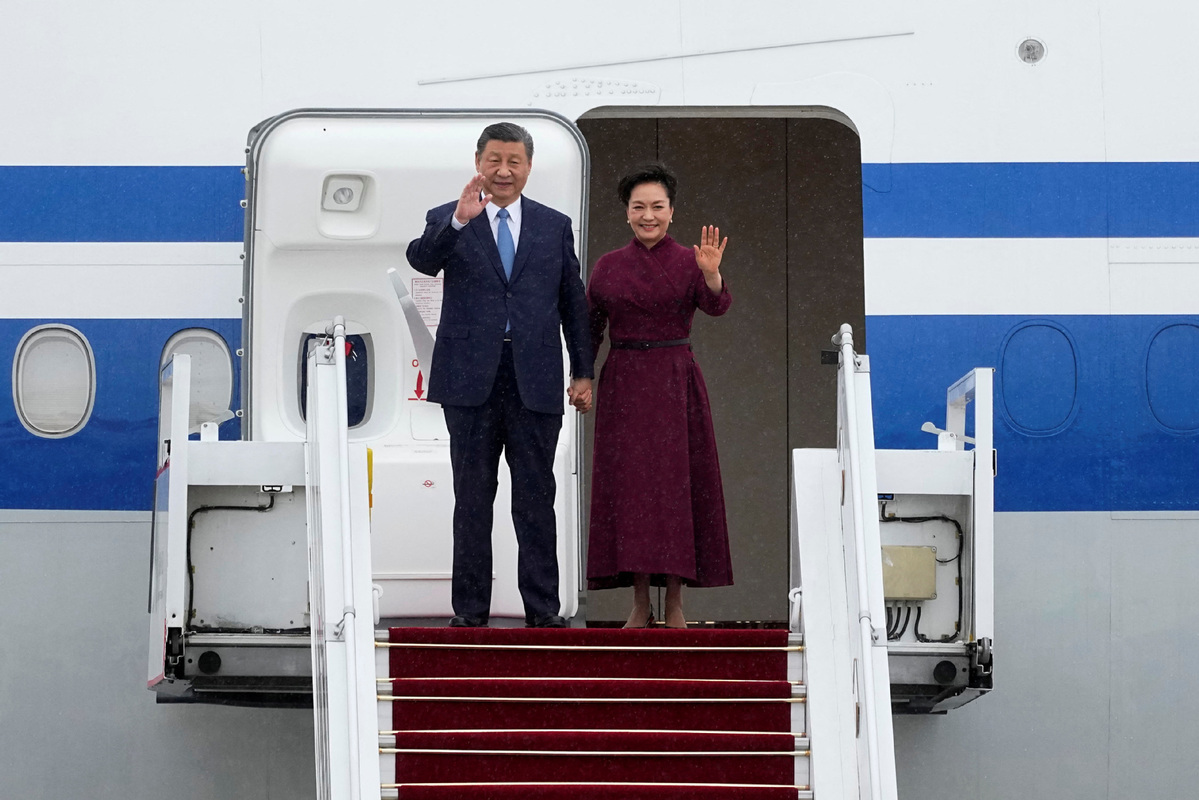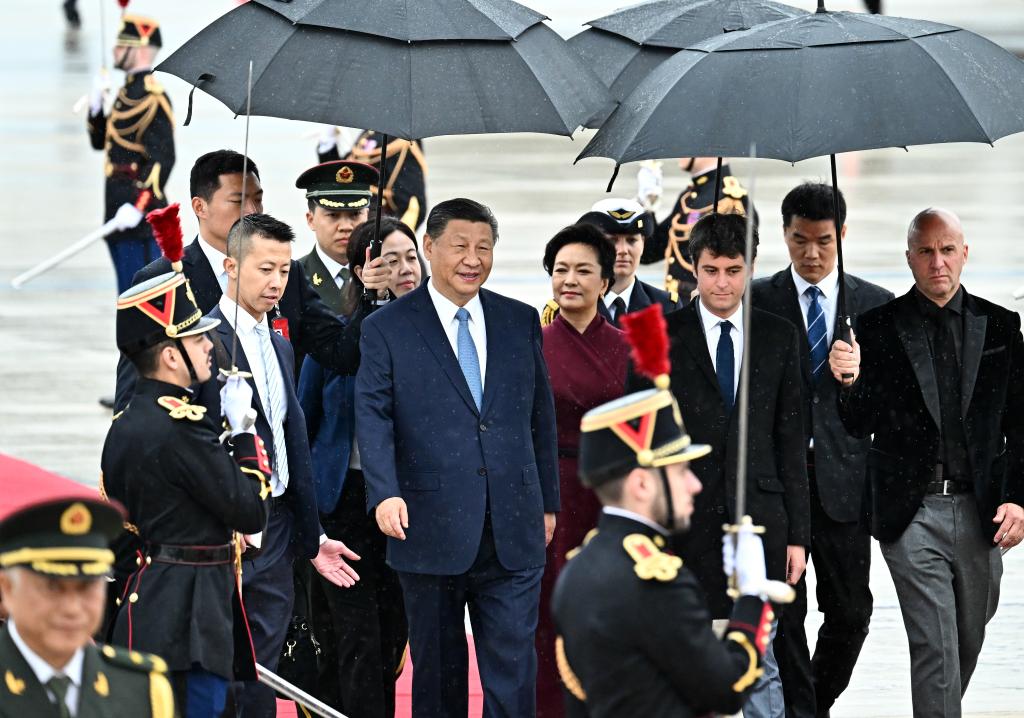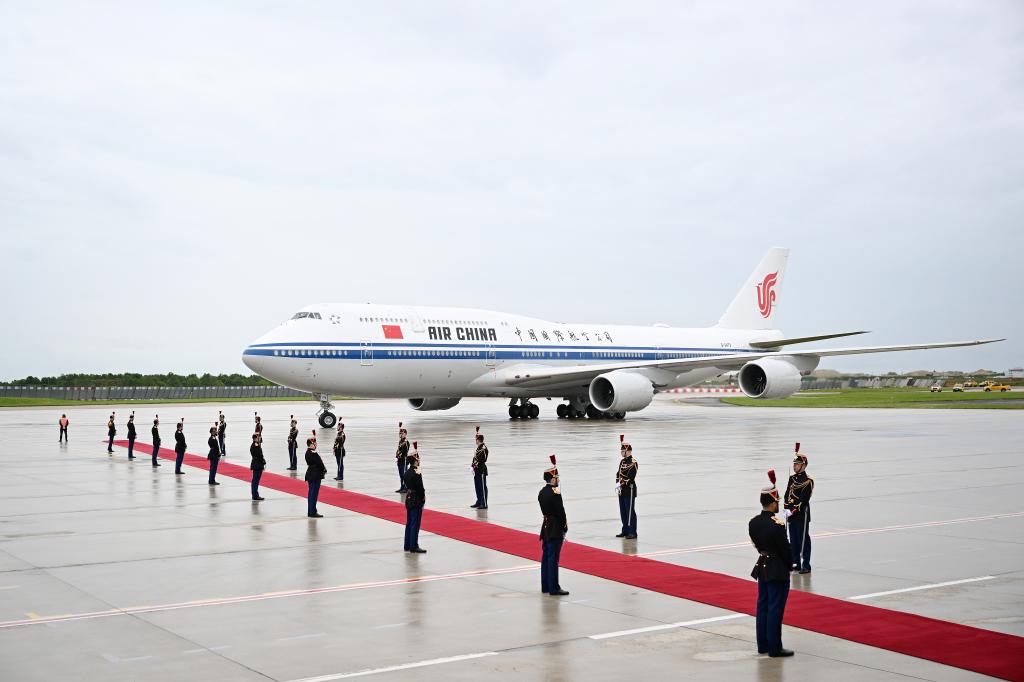
President Xi Jinping arrived in Paris on Sunday in a significant diplomatic move to strengthen relations with China's key European partners, a trip widely expected to reaffirm and solidify robust ties while better managing differences.
Xi and his wife, Peng Liyuan, were greeted by French Prime Minister Gabriel Attal upon their arrival at Paris Orly Airport, in a ceremony that included a guard of honor and a red carpet. The landmark visit, Xi's third after those in 2014 and 2019, came as the two nations celebrate the 60th anniversary of diplomatic relations this year.
In written remarks delivered at the airport, Xi noted that ties between China and France have always stood at the forefront of China's diplomatic relations with Western countries, and he hailed the two sides' setting an example for peaceful coexistence and win-win cooperation between countries of different social systems
In written remarks delivered at the airport, Xi noted that ties between China and France have always stood at the forefront of China's diplomatic relations with Western countries, and he hailed the two sides' setting an example for peaceful coexistence and win-win cooperation between countries of different social systems.
He emphasized that he hopes the visit can present an opportunity for both nations to consolidate their traditional friendship, build up political mutual trust, forge strategic consensuses and deepen exchanges and cooperation across various sectors.
ALSO READ: Xi leaves for state visits to France, Serbia, Hungary
The two nations should "light up the path ahead with the torch of history, work toward an even better future of China-France relations, and make new contributions to global peace, stability and development", he said.
Xi and his host, French President Emmanuel Macron, are set to exchange views on bilateral ties, China-European Union relations and major global and regional issues, and the two heads of state will meet outside Paris for further in-depth interactions.
The Chinese president's six-day trip to Europe — his first tour overseas this year — will also include key engagements with the leaders of Serbia and Hungary.
Some analysts have underlined the important role of stronger collaboration on strategic issues between China and France in ensuring the stability of ties between China and the EU and solving global challenges going forward.

Feng Zhongping, director of the Chinese Academy of Social Sciences' Institute of European Studies, said that head-of-state diplomacy has been instrumental in leading the way for ties between Beijing and Paris, which have long stood at the forefront of China's relations with Western countries.
"The frequent personal interactions between Xi and Macron have charted the path forward for bilateral relations, and the strategic dialogue" between the two leaders during the trip will "pave the way for a higher level of mutual trust and cooperation", he said.
Meanwhile, a more solid and robust comprehensive strategic partnership between China and France will enable a better response to global challenges such as climate change, Feng said.
ALSO READ: China, France see scope for cooperation
"This tour holds particular significance, as it comes at a time of complex international dynamics, where global and geopolitical challenges necessitate collaboration between China and Europe to uphold and practice genuine multilateralism," he added.
Jin Ling, a research fellow on European studies at the China Institute of International Studies, said that stronger certainty in the relationship between Beijing and Paris will add greater certainty to the ties between China and the EU.
Xi's trip to Serbia and Hungary, two of China's long-standing partners in Europe, has also been eagerly anticipated by leaders of both countries
"France has a long tradition of strategic autonomy in Europe, and this autonomy has been one of the key factors for deep-seated friendship with China," she said.
Despite differences between Beijing and Brussels, the headquarters of the EU, they both oppose decoupling and the severing of supply chains, while upholding multilateral resolution of global issues, she said.
Xi's trip to Serbia and Hungary, two of China's long-standing partners in Europe, has also been eagerly anticipated by leaders of both countries.
ALSO READ: Fruitful alliance
Serbian President Aleksandar Vucic expressed high expectations for the trip during a recent interview. "Personally, I am very jubilant to see and to host President Xi. He is a great leader and a great friend of Serbia, and we consider ourselves as a great friend of China as well," he said.
"We have a lot of common denominators in our cooperation and collaboration, and we will carry on with that," Vucic added.
The ironclad ties between China and Serbia are underpinned by robust economic and trade relations — bilateral trade volume between China and Serbia has increased eightfold over the past decade, and China has maintained its position as Serbia's second-largest trading partner for several years.
Feng, the Institute of European Studies director, said there is immense potential to build up people-to-people ties between China and Serbia, with both nations sharing a strong sense of cultural affinity toward each other.
READ MORE: Xi’s 3-nation Europe trip to boost ties
Peter Szijjarto, Hungary's minister of foreign affairs and trade, said in a recent interview with China Central Television that it is a "great honor" for his country to host the Chinese president on the occasion of the 75th anniversary of the establishment of diplomatic ties between Beijing and Budapest.
"Our expectation is that we (are) entering a new chapter in this relationship through this visit," he said, adding that the Hungarian government has already proposed joint infrastructure projects with China under the Belt and Road Initiative.

Hungary has become one of the top destinations for Chinese electric vehicle makers and EV suppliers, with BYD, Nio, CATL and Eve Energy already making major investments in the country.
Feng said that for China, "building up ties with Hungary, an EU member, will help clear up misunderstandings of Brussels and strengthen mutual trust with other EU members".
For Hungary, the enhancing of cooperation with China has already proved rewarding and will help the nation continue to energize its economic growth and enhance job creation, he added.


